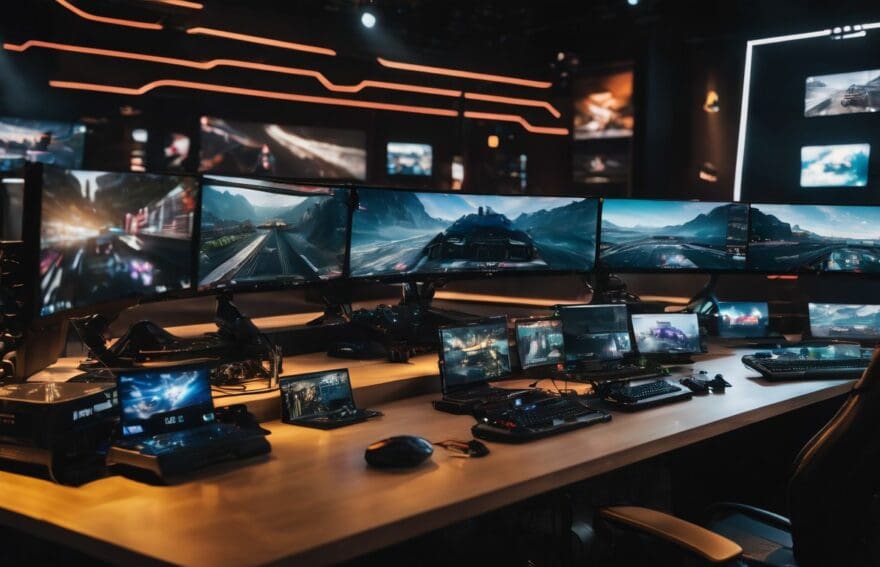From Local Tournaments to International Fame: The Esports Journey

Updated On: October 24, 2025 by James Connolly
Ever found yourself pondering how the razzmatazz of esports leapt from humble local gatherings to dazzling international fame? You’re not alone. We’ve delved deep into this electrifying evolution, tracing the steps from good old LAN parties to today’s global gaming extravaganzas.
Our piece peels back the layers of this enthralling journey, shedding light on its climb up the popularity charts and what it spells for avid gamers like you. Ready to dive into the spellbinding metamorphosis of competitive gaming? Well then, let’s crack on!
The Evolution of Esports
Esports has come a long way from its humble beginnings at LAN parties to becoming a global phenomenon with online tournaments that attract millions of viewers. The evolution of technology and the increasing popularity of competitive gaming have played a crucial role in shaping the landscape of esports.
From LAN parties to global online tournaments
Back in the day, we huddled around bulky monitors, our fingers dancing over keyboards and mice at LAN parties. Those were the early battlefields where we honed our skills elbow to elbow with fellow gamers.
They laid the groundwork for what would become a transformative movement in competitive gaming history. From these intimate gatherings emerged a global platform where today’s tournaments take place online, drawing contenders from every corner of the world.
With advancements in technology and connectivity, we’ve transitioned smoothly into an era of international competitions that boggle the mind. It’s awe-inspiring to see teams from different continents go head-to-head in games like League of Legends or Overwatch, fighting for glory and prize pools that can reach into millions.
These global events have turned skilled players into household names, their feats watched live by legions of fans across oceans – all thanks to those pioneering LAN parties that started it all.
The Rise of Esports Tournaments
Esports tournaments have come a long way from small local competitions to becoming international spectacles that draw in millions of viewers and offer significant prize pools. Want to know how this journey unfolded? Keep reading to find out more!
From local competitions to international spectacles
Esports events have grown from small local tournaments into captivating international spectacles, attracting audiences from all around the world. The journey began with passionate gamers organising grassroots competitions and LAN parties, paving the way for today’s prestigious global championships like the League of Legends World Championship and Dota 2’s International.
These events offer substantial prizes and draw international teams, fostering a sense of unity among players and fans across different countries and regions.
International esports tournaments have not only elevated gaming to mainstream fame but also created a lucrative industry for entrepreneurs and investors. As these events continue to capture the attention of both novice and expert gamers alike, they highlight the industry’s evolution from niche hobby to worldwide phenomenon, setting the stage for further growth in years to come.
The impact of these tournaments has been monumental as they bolster fandoms, inspire new generations of players, while offering testament to their potential reach beyond just gaming communities.
The Influence of Esports on Gaming Culture
Esports has significantly shaped and influenced gaming culture, propelling it from a niche hobby to a mainstream phenomenon. International esports tournaments, such as the League of Legends World Championship and Dota 2’s International, have not only attracted massive audiences but also bridged gaps between different countries and regions.
The rise of esports has transformed professional players into celebrities, inspiring new generations of gamers and creating a dedicated fandom.
Furthermore, the evolution of esports events from local competitions to international spectacles has provided a profitable avenue for entrepreneurs and investors while showcasing its impact on the gaming industry.
As passionate gamers organised and participated in local tournaments and LAN parties, they laid the foundation for what esports is today – a prominent force shaping modern gaming culture.
The growing influence of esports continues to draw in significant investments, highlighting both its present impact on gaming culture and its potential for future achievements.
The Professionalisation of Esports
The professionalisation of esports has led to mainstream media coverage, the diversification of esports titles, and the development of a robust esports ecosystem. Interested in learning more about the journey from local tournaments to international fame in the world of competitive gaming? Keep reading to explore this exciting evolution!
Mainstream media coverage
The mainstream media now covers esports as a legitimate sporting event, with major networks broadcasting tournaments and leagues. Esports coverage has gone beyond niche gaming communities to capture the attention of a global audience, drawing in viewers who may not have been previously interested in competitive gaming.
As the industry continues to grow, mainstream media coverage plays a crucial role in elevating the status of esports, solidifying its position as a major player in the entertainment world.
The diversification of esports titles has led to increased mainstream media interest and investment opportunities for broadcasters and sponsors. The exposure gained from such coverage contributes significantly to enhancing the visibility and popularity of esports on an international level.
This recognition has helped cement the professionalisation of competitive gaming, attracting top talent, substantial prize pools, and corporate partnerships that rival traditional sports sponsorships.
Diversification of esports titles
Esports has witnessed a diversification of game titles, expanding from traditional favourites to new and innovative options. Games like Overwatch and League of Legends have transformed the esports landscape, engaging international teams in high-stakes competitions for substantial prizes.
As a result, there is now an impressive variety of games represented in professional tournaments, catering to different playstyles and preferences within the gaming community.
This constant stream of new titles not only keeps things fresh but also widens the reach of esports to draw in more diverse audiences. With each new game title that enters the competitive arena, it brings with it a unique set of skills and strategies that captivate both seasoned players and newcomers alike.
The esports ecosystem
The esports ecosystem encompasses various elements that contribute to the thriving competitive gaming industry. With international tournaments drawing in massive audiences and substantial investments, the landscape has evolved significantly from local competitions to a global phenomenon.
Notably, professional players have transitioned into celebrities, inspiring a new generation of gamers and cultivating dedicated fandoms for popular titles like Overwatch and League of Legends.
As diverse esports titles continue to gain mainstream recognition, the industry’s growth demonstrates the potential for even greater achievements in the future.
The Global Phenomenon of Esports
Esports has become a global phenomenon, with millions of fans tuning in to watch their favourite players and teams compete. However, the industry has faced various challenges and controversies as it continues to grow, raising questions about its future.
Challenges and controversies
The growth of esports from local tournaments to international fame has brought about several challenges and controversies. One prominent issue revolves around the regulation and recognition of esports as a legitimate form of competition.
This has raised questions regarding player rights, fair treatment, and ethical considerations within the industry. Additionally, concerns over inclusivity, diversity, and representation have emerged as key topics for discussion in the gaming community.
As esports continues to expand its reach globally, cultural sensitivities and regional differences pose significant obstacles that require careful navigation by event organisers and game developers.
Moreover, the increasing commercialisation of esports has sparked debates surrounding sponsorship deals, advertising practices, and potential conflicts of interest within competitive gaming.
Future of esports
Transcending challenges and controversies, the future of esports holds immense potential for monumental growth and innovation. As the gaming industry continues to expand its influence on mainstream culture, we anticipate an increase in global participation and interest from both seasoned professionals and burgeoning talent.
With advancements in technology driving immersive gaming experiences, there is a palpable sense of excitement surrounding the evolution of esports tournaments into even grander spectacles.
The ongoing diversification of esports titles and genres will open doors for fresh opportunities, welcoming new audiences while further enriching the competitive landscape. Alongside this expansion, we can expect continual improvements in infrastructure, broadcasting capabilities, and spectator engagement—resulting in a more inclusive experience that invites widespread enthusiasm.
Conclusion
The journey of esports is a compelling story of progression. It started from local competitions and LAN parties, steadily gaining momentum to evolve into international spectacles that captivate audiences globally.
The rise of esports has transformed gaming from a niche hobby to a mainstream competitive industry, drawing in massive audiences and significant investments. As the industry continues to adapt and grow, its potential for even greater achievements and milestones in the future becomes increasingly apparent.
FAQs
1. How do gamers go from local tournaments to international fame?
Gamers start their journey in small local tournaments and, through skill and dedication, progress to compete in global esports competitions that bring gaming fame.
2. Has esports always been a well-known industry?
No, originally considered a niche hobby, competitive gaming has grown massively over recent years into a mainstream professional esports industry.
3. What kind of events make up the esports industry?
The esports industry includes all sorts of video game competitions, ranging from regional gaming championships to major international professional gaming tournaments.
4. Can anyone join professional esports competitions?
Yes! With practice and talent, any gamer can climb the ranks in competitive gaming journeys and participate in professional Esports Competitions worldwide.
5. What benefits come with achieving success in Esports Competitions?
Successful players often gain recognition within the global community alongside potential endorsements plus significant prizes from competing at the top levels of Gaming Tournaments.








